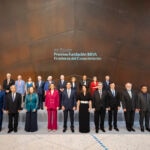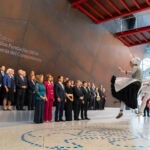The BBVA Frontiers Awards recognize the value of knowledge to tackle the challenges of our time
The President of the BBVA Foundation, Carlos Torres Vila, championed the power of knowledge during the ceremony for the 16th BBVA Foundation Frontiers of Knowledge Awards. Knowledge is the key to solving the problems we are experiencing as a society, at a moment when humanity is going through an unprecedented wave of disruption and faces the challenges of climate change, he said.

During his speech, Carlos Torres Vila also underlined the need to attract the best talent and considerable capital to tackle the challenge of climate change. This is a challenge that, in most cases, will require the development of new technologies to help us decarbonize the planet, he explained. For that reason, “today more than ever before, we must invest in the future and commit to knowledge and innovation,” he added.
“Governments and the private sector have a great responsibility in the face of this challenge. Public institutions must generate stability, trust, while developing the right incentives so that the private sector can channel the capital needed for this transition. And both parties, in a coordinated manner, must support researchers like the ones who are present here today, who dedicate their lives and efforts to move the frontiers of knowledge beyond the imaginable limits,” the President of the BBVA Foundation underlined.
At the event held in Euskalduna Bilbao convention center to recognize 17 world leaders in scientific research and artistic creation, Carlos Torres Vila emphasized that, in the face of such complex challenges, “knowledge is the best guiding light and the tool to understand the world around us.”
This is the fifth time that the Bizkaia capital has welcomed the Frontiers Awards presentation events, following the Foundation’s decision in 2019 to make Bilbao their permanent home. Torres Vila stressed in his speech that “a hallmark of BBVA’s identity is that it does not see its purpose as to operate transitorily in different world geographies, but to put down deep roots in each, building dialogue and commitment with the communities it serves, made up of businesses, individuals, families and public institutions, and respecting each region’s economic, social, cultural and institutional singularity. Undoubtedly, Bilbao and the Basque Country as a whole are especially expressive of the bank’s roots, and the innovative spirit that presided its founding in the mid-19th century.”

Co-chaired by the BBVA Foundation President and the President of the Spanish National Research Council (CSIC), Eloísa del Pino, the ceremony also featured a welcome address by the Mayor of Bilbao, Juan Mari Aburto, and a closing speech from the General Deputy for Bizkaia, Elizabete Etxanobe.
CSIC President Eloísa del Pino said of the Frontiers of Knowledge Awards that “they have always understood the complexity of our world as an object of research.” Their message, as such – one reflected in their eight categories – is that “only through the diversity of scientific disciplines can we hope to apprehend the extraordinary universe in which we live.” For Dr. Del Pino, the achievements distinguished in this 16th edition show that “when scientists look beyond the security we get from the hyperspecialization of our knowledge fields and start venturing into other areas or disciplines, we not only achieve a wider-reaching and more disruptive science, but also a more empathetic science, better able to understand and engage with citizens at a time when it is most needed.”
The ceremony also welcomed a sizable representation of the international committees deciding the eight award categories, which draw their members from some of the top universities in Europe and North America. Among the more than 1,000 people in attendance were eminent researchers, artists and academics from the Spanish scientific and cultural community, as well as executives from the worlds of business and the media.
All the winners of the 16th Frontiers of Knowledge Awards
Among the awardees are the researchers who opened up new avenues for the treatment of multiple diseases through their discoveries on protein function, and the computer vision pioneer who brought us robotic surgery, autonomous cars and facial recognition. Recognition was also extended to key contributions in tackling the environmental crisis, like the discovery of the linkage between CO2 and global warming enclosed in the polar ice; the quantification of the scale of the sixth mass extinction of species; the grounding of the fields of environmental economics and the economics of biodiversity; and the definition of the motivating levers for action against climate change.
- Basic Sciences: Claire Voisin and Yakov Eliashberg.
- Biology and Biomedicine: F. Ulrich Hartl, Arthur Horwich, Kazutoshi Mori and Peter Walter.
- Information and Communication Technologies: Takeo Kanade.
- Ecology and Conservation Biology: Rodolfo Dirzo and Gerardo Ceballos
- Climate Change: Dorthe Dahl-Jensen, Jean Jouzel, Valérie Masson-Delmotte, Jakob Schwander and Thomas Stocker.
- Economics, Finance and Business Management: Partha Dasgupta.
- Humanities and Social Sciences: Elke Weber.
- Music and Opera: George Benjamin.
26 Frontiers laureates have gone on to win the Nobel Prize
An external indicator of the excellence of the Frontiers of Knowledge Awards is that 26 of the researchers recognised by the BBVA Foundation's accolades went on to become Nobel laureates.
- Eleven Frontiers winners have gone on to win the Nobel Prize in Economics: Lars Peter Hansen (2013), Jean Tirole (2014), Angus Deaton (2015), William Nordhaus (2018), Abhijit Banerjee and Esther Duflo (2019), Paul Milgrom y Robert Wilson (2020), David Card (2021), Ben Bernanke (2022) and Claudia Goldin (2023).
- Six Frontiers laureates subsequently received the Nobel Prize in Medicine from the Nobel Assembly at Karolinska Institutet: Shinya Yamanaka (2011), James P. Allison (2018), David Julius y Ardem Patapoutian (2021) and Katalin Karikó and Drew Weissman (2023).
- Six Frontiers laureates subsequently received the Nobel Prize in Physics from the Royal Swedish Academy of Sciences: Didier Queloz and Michel G. E. Mayor (2019), Klaus Hasselman and Syukuru Manabe (2021), and Ferenc Krausz and Anne L’Huillier (2023).
- Finally, in the case of the Nobel Prize for Chemistry, three Frontiers laureates went on to receive the award from the Royal Swedish Academy of Sciences: Robert J. Lefkowitz in 2012, and Emmanuelle Charpentier and Jennifer Doudna in 2020.